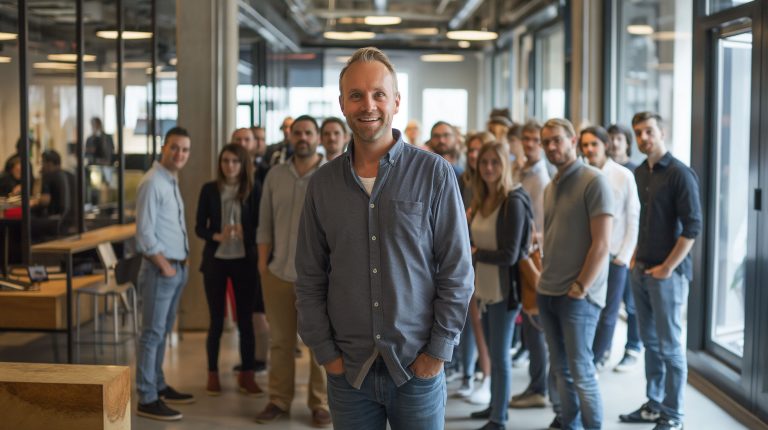Unternehmen stehen heute oft vor schnellen radikalen Veränderungen und benötigen daher agile Strukturen, Innovationskraft und unternehmerisches Engagement der Belegschaft, um weiter erfolgreich zu sein. Die langfristige Förderung unternehmerischen Handelns bedingt dabei mehr als nur eine oberflächliche Änderung der Arbeitsumgebung. Gefragt ist das Empowerment der Mitarbeiter durch HR, um Selbstbestimmung, Verantwortungsbewusstsein und Transparenz zu fördern.
Konkret erfordert der Wandel hin zu einer unternehmerisch geprägten Belegschaft:
1) Selbstbestimmung ermöglichen:
- Freiräume für eigenständiges Arbeiten schaffen
- Entscheidungsbefugnisse an Fachexperten delegieren
- Kontrollsysteme reduzieren
- Führungskräfte als Sparringspartner und Enabler etablieren
2) Verantwortungsbereitschaft fördern:
- Fehlerkultur etablieren, aus Fehlern lernen
- Blick über den Tellerrand hinaus fördern
- Verantwortung für Team und Arbeitsumfeld stärken
- Leistung anhand des gesamten Portfolios beurteilen
3) Transparenz schaffen:
- Klarheit über aktuelle Entwicklungen und Ziele vermitteln
- Leitziele in den Mittelpunkt des Handelns rücken
- Aufgaben und Beiträge jedes Einzelnen transparent machen
- Kennzahlen, Prozesse und Ressourcen offenlegen
Den Start richtig organisieren
Für die meisten Firmen stellt der kulturelle Wandel, um die Mitarbeiter zu ermächtigen und Nachhaltigkeit zu fördern, eine herausfordernde Aufgabe dar. Um die Erwartungen zu managen und die Glaubwürdigkeit zu wahren, empfiehlt es sich, abhängig vom Ausgangspunkt und der Unternehmenserfahrung, einen schrittweisen Umsetzungsplan zu entwickeln. Es ist ratsam, mit den fortgeschritteneren Unternehmensbereichen und Mitarbeitergruppen den Prozess der Transformation hin zu einem unternehmerischen Team zu starten. Bei der Auswahl der relevanten Abteilungen ist es hilfreich, das unternehmerische Potenzial der Organisation sowie der Mitarbeiter zu berücksichtigen. Eine Empowerment-Checkliste kann als Grundlage dienen, um den organisatorischen Reflexionsprozess zu unterstützen.
Checkliste Unternehmertum und Empowerment:
- Organisationskultur:
- Kreativität und Innovationskraft fördern
- Transparenz bezüglich Entwicklungen und Zielen
- Durchlässige Kommunikationskultur
- Umgang mit Veränderungen
- Entscheidungsfreiheit und Autonomie
- Flexible Ressourcenzuweisung
- Teamkultur und Wir-Gefühl
- Fehlerkultur
Entrepreneuriales Potenzial der Organisationsakteure
Sind Führungskräfte in der Lage, ihr Team zu inspirieren und zu motivieren?
- Zeigen sie die Bereitschaft, ihren Mitarbeitern Kompetenzen und Verantwortlichkeiten zu übertragen, ohne dabei eine ständige Kontrolle auszuüben?
- Betrachten sie ihre Rolle eher als Coaches und Unterstützer oder legen sie Wert auf Abstand und hierarchische Strukturen?
- Genießt das Management Glaubwürdigkeit aufgrund seiner Erfolge?
- Verfügen Mitarbeiter und Führungskräfte über umfassende Kenntnisse und Fähigkeiten auf verschiedenen Gebieten wie Produktion oder Vertrieb?
- Oder liegt der Schwerpunkt hauptsächlich auf spezialisiertem Fachwissen?
Der Weg lohnt sich
Die heutige Unternehmenslandschaft erfordert agile Strukturen zur Anpassung an Veränderungen. Eine widerstandsfähige und innovationsfördernde Unternehmenskultur ist daher entscheidend. Als besonders wirksam erweist sich, Mitarbeitenden in ihrer Handlungsbereitschaft zu stärken. Es gilt zunächst, diese für Selbstbestimmung und Verantwortung zu sensibilisieren und zu qualifizieren. Nötig ist dabei Klarheit über die Vergangenheit und Ziele des Unternehmens, über die Leistungserwartungen als auch bereits begangene Fehler. Dieser Prozess ist herausfordernd und langwierig, aber lohnenswert.




